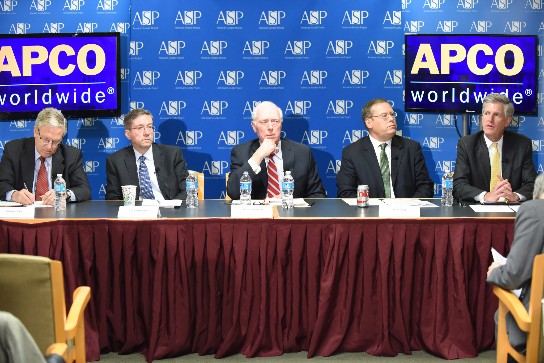
Enhancing Security and Cooperation through TTIP: ASP Conference
Podcast: Play in new window | Download
Subscribe: Apple Podcasts | RSS
At ASP’s Geopolitics of TTIP Conference, was chaired by ASP President and President of McLarty Associates Nelson Cunningham, and featured: Mr. Kurt Tong, Deputy Assistant Secretary for the Bureau of Economic and Business Affairs at the State Department; Lt. Gen. Dan Christman USA, Ret., Senior Vice President for International Affairs at the United States Chamber of Commerce; Dr. Daniel Hamilton, Director for Transatlantic Relations at Johns Hopkins’ School of Advanced International Studies; and Ambassador Charles Ries, currently a Vice President at RAND Corporation. These experts spoke on the importance that TTIP will have on future U.S.-EU relations.
Speaking first was Mr. Kurt Tong, who spoke on why TTIP and TPP specifically are important trade agreements for U.S. policy:
“The way to be competitive when you are a high-value added economy is fair rules and clear rules, and an operating environment which is not to the disadvantage of U.S. companies or U.S. workers and farmers.”
Mr. Tong emphasized that TTIP will enhance the U.S.-EU relationship by creating commonality in agenda setting, and explained that broad multilateral trade agreements are ideal for the U.S. since it takes a lot fewer political resources to get one large agreement through Congress rather than numerous small ones. Mr. Tong predicts that TTIP will make the U.S. and EU function more as a team, and present a stronger unified force on security and economic issues.
Speaking next was Lt. Gen. Dan Christman USA (Ret.), who spoke more with an emphasis to the security benefits of a large free trade agreement with Europe:
“[TTIP] is the equivalent of a forward deployed armor brigade in Poland, or the Baltics. There are huge geostrategic movements on the European continent, and I think you know from where they derive, and U.S. forward presence, especially ground troops, have enormous impact. I judge TTIP in those terms.”
General Christman spoke of the importance of TTIP as a tool to enhance Europe’s hard security through economic security, specifically declaring that TTIP would help European nations to “fill the coffers” and put them in a better position to reinvest in their flagging military spending. In addition to this military strength through economic strength, Christman referenced the importance of TTIP in making Europe less reliant on Russia for strategically important resources like energy. Perhaps most importantly, he emphasized that Russia fears strengthened U.S.-EU ties, and wants to undercut those relationships. The U.S. should not allow that to happen.
Speaking more on how TTIP will play into U.S. grand strategy was Dr. Hamilton:
“It’s about repositioning the United States for the world it’s facing, not the world it left behind, and to do that with a whole set of other partners. In terms of the transatlantic piece of this it’s about the U.S. and Europe repositioning themselves for a world with much more diffuse economic power and intensified global competition that reaches far beyond the economics.”
Dr. Hamilton expressed that TTIP and TPP are about setting the terms for economic integration, and creating a set of standards that brings issues to the table which are not being discussed in the WTO. Dr. Hamilton said that TTIP was about, “maintaining standards—not lowering them,” and described TTIP and TPP as a “WTO Plus” which will set the terms for our economic cooperation globally. On a more regional level, Dr. Hamilton supported TTIP as a means of creating an anchor for cooperation between the U.S. and the EU in other areas of partnership, specifically citing NATO as an example.
Speaking last was Ambassador Charles Ries:
“[TTIP is] in a sense is a great inspiration to the startup nation, the idea that we can start up a new business and reach instead of 300 million customers, we can reach 700 million customers, with consequent benefits for the new venture capitalists to come. So I actually think that will also be in little towns in Kansas, or elsewhere around the United States and Europe, a great great incentive and proof positive that Washington and Brussels are doing something that makes a difference to the average person, both as a consumer and as a supplier.”
Ambassador Ries was keen to point out that for everyone, from every perspective, TTIP provides all sorts of benefits to the U.S.-EU relationship. Most pronounced of this is that the average person will be able to see the benefits of these integrated rules, where people will be able to buy and sell goods across the Atlantic much more easily than before. Ambassador Ries praised TTIP for its ability to finally overcome the typical regulatory barriers that come up in trade agreements, pointing out that a broad agreement will finally be able to address these issues to transatlantic trade, and bring prosperous opportunities to both the EU and U.S. economies.

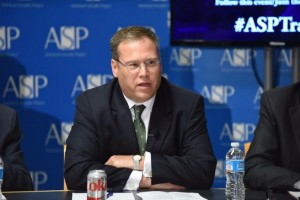
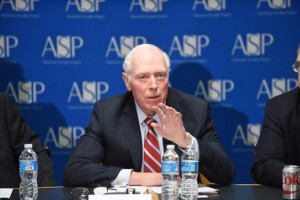
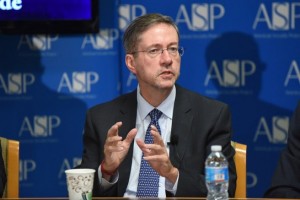
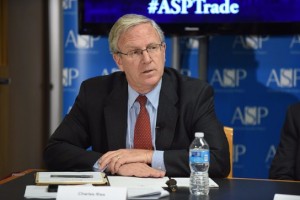





[…] The first panel discussed the impact that TTIP will have on future US-EU relations. Topics included an effort to streamline agenda-setting and overall political processes regarding trade, reinvestment in European military spending, and integration of markets. […]